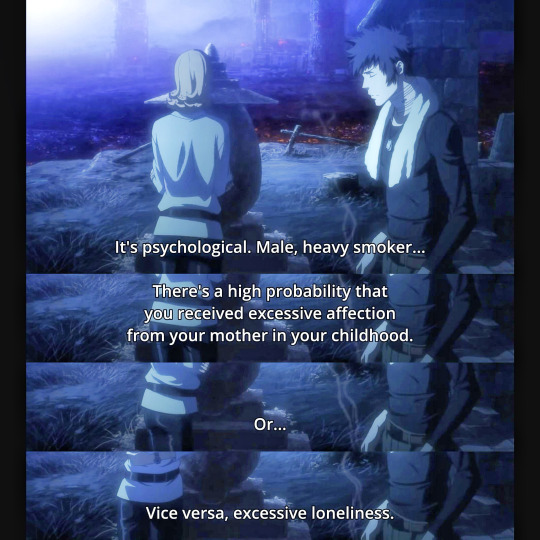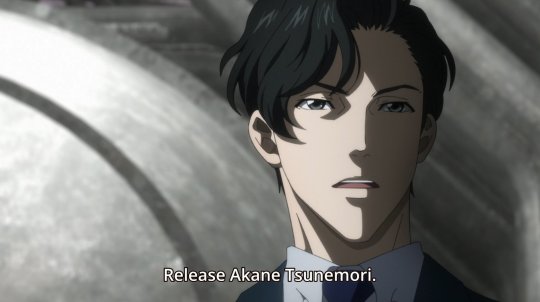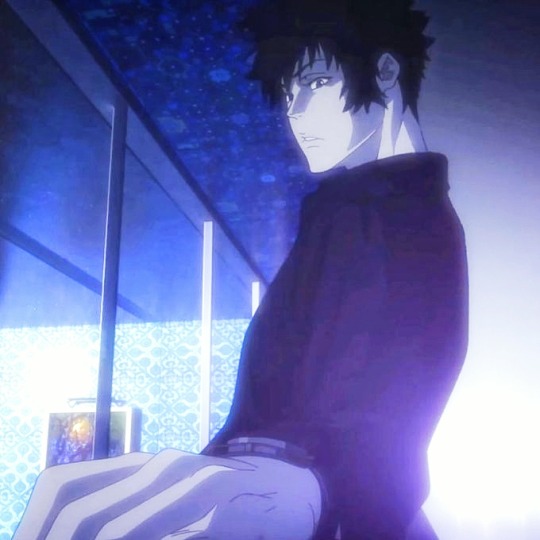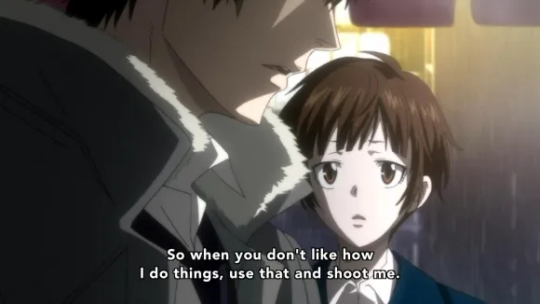びきちゃん • Pronoun: 君 • 芸術的目的: PSYCHOPASS Logs | General Anime |株式会社プロダクション・アイジー works
Don't wanna be here? Send us removal request.
Text
Don’t hold on to someone who’s leaving, otherwise you won’t meet the one who’s coming.
~Carl Gustav Jung


I dunno why, but I always picture Homura-san looking at Shinkane over their balcony scene.
🤭🙈
#psycho pass#shinya kogami x akane tsunemori#ppofficial#shizuka homura#shizuka homura x akane tsunemori
0 notes
Text
"Love is not about sex, going on fancy dates, or showing off. It’s about being with a person who makes you happy in a way nobody else can."

Chained together in a helipad, Shinya Kogami subtly smirk upon seeing Akane Tsunemori while being gunned by Rutaganda.

..and who could forget the balcony scene a night before 😉💓
I never rewatched a movie. I don't know but it feels like it looses it's luster to me whenever I do a rewatch. But if there's one anime film I would love to re-experience for the first time, that would be Psycho Pass The Movie...
😘👌🏻💓
#shinya kogami x akane tsunemori#psycho pass#psycho pass providence#shinkane#ppofficial#kogami shinya#akane tsunemori
5 notes
·
View notes
Text
Loneliness is difficult to confess; difficult too to categorise. Like depression, a state with which it often intersects, it can run deep in the fabric of a person, as much a part of one’s being as laughing easily or having red hair.
~Olivia Laing, The Lonely City

Shinya Kogami in caught in a melancholy...
22 notes
·
View notes
Text
“I have loved you with an everlasting love; I have drawn you with unfailing kindness.”
Jeremiah 31:3 🙏🏾🫶🏾
www.evamacdesigns.com
@evamacdesigns
#evamacdesigns #god #christian #godisgood #jesus #jesuslives #jesusquotes #godfirst #proverbs #proverbs31woman #amen #prayer #worshiphim #worshipmusic #godbless #christianquotes #christianpost #christiangirl #godsaves #graphicdesigner #socialmediamanager #virtualassistant #christianwoman #bible #worship #saved #blessings
84 notes
·
View notes
Text
Does Kogami ever thought of Marriage
Shinya Kogami’s character evolution across the Psycho-Pass series and movies, with a focus on how his development might affect thoughts of relationships or marriage:

Visualizing Kogami leaving an untraceable call to Akane when he left via boat from Japan.
Here's to answer a question left hanging on the ask section for awhile. As I've mentioned, I no longer answer Ask directly. But all thoughts/opinions are welcome 🤗
And yes, when there's available time I will try to engage in a conversation with my famdom (family fandom) in Psycho Pass 😘
So let's dive in...
Season 1 (2012)
Role: Enforcer under Akane Tsunemori State of Mind:
Deeply obsessed with vengeance for his fallen partner, Sasayama.
Emotionally detached, though shows respect and camaraderie with Akane.
Views himself as expendable in the pursuit of justice. Marriage Thoughts: Highly unlikely—he’s consumed by revenge and moral conflict.
Psycho-Pass: The Movie (2015)
Role: Operative working with Southeast Asian rebels State of Mind:
Living in exile, seemingly at peace with his outlaw status.
More emotionally open, especially in his reunion with Akane.
Shows growth and self-awareness, moving away from pure vengeance. Marriage Thoughts: More plausible—he’s mellowed slightly and seems more grounded, but still sees himself as someone who doesn't belong in society.
Sinners of the System Case 3: On the Other Side of Love and Hate (2019)
Role: Mentor to Frederica Hanashiro and moral guide to young soldiers State of Mind:
Reflective, wiser, and trying to prevent others from making his mistakes.
Demonstrates empathy and moral clarity. Marriage Thoughts: Possibly. He’s no longer driven solely by justice or revenge. This version of Kogami seems more capable of forming a meaningful, long-term connection.
Season 3 (2019)
Role: Operative working with the Suppressing Action Department State of Mind:
Confident, reserved, and focused on dismantling deeper corruption.
Works behind the scenes with Akane, showing a deep trust and understanding. Marriage Thoughts: Still unlikely, but his capacity for emotional connection is clear—especially toward Akane, suggesting a potential, if unspoken, bond.
In My Opinion:
My thoughts, your thoughts, anyone's thoughts?
Kogami grows from a vengeance-driven enforcer to a more contemplative, morally grounded man. While he never expresses interest in marriage, his evolution hints that he could consider it—if he ever found peace or a life beyond the system. His connection with Akane remains the most emotionally significant relationship, and some fans interpret it as an unspoken love story.
🤔
Oh, I missed these tags 🤣
#psycho pass providence#psycho pass#ppofficial#kogami shinya#shinya kogami x akane tsunemori#shinkane#koaka
28 notes
·
View notes
Text
Is Kogami-san cír@#$&!?~cised?
🤭
Hi everyone, I'm back from the shadows. I got notif about a certain anon ask regarding Kogami's "rite".
And lately, I don't answer directly in the ASK section.
Medical circumcision in Japan happens primarily in cases of phimosis or other health concerns, which is quite rare.
If he had undergone any medical issues requiring circumcision, it might have been referenced (even subtly) in his characterization, but no such hints exist!

Kogami was born in Japan, presumably into an ordinary Japanese family. There is no indication that he had a Westernized upbringing that might have made circumcision more likely. Despite Japan's technological advancement in the PP timeline.
so the answer is, most likely, No. In Japan, circumcision is uncommon, and there is no evidence in Psycho-Pass suggesting Kogami underwent the procedure for medical or personal reasons. Given his background, he is almost certainly not.
😉🤭☺️
Okay, now back to work...
5 notes
·
View notes
Text
The burger we all crave for to taste. 🍔🤭
Where's butler Kogami?
The Buddy Pasta was a big hit 🍝 and also Kogami-latte ☕

ノイタミナ, Kogami Burger Please? 🤭


5 notes
·
View notes
Text
What if?? PP Highschool?
It's not uncommon for immensely popular anime/manga to have a highschool spinoff.
Attack on Titan: Junior-High 👋🏻😁
Gintama: Ginpachi-sensei 😆✋🏻
If there's an official announcement of PP H.S count me in 🙋🏻♀️🤭😉😂
💠💠💠💠
Now, imagine a pivotal scene, like Akane reading Kogami's letter (saying goodbye after he transferred to another school 😋).
...And whenever she misses him, she could relive those tender moments when he tapped her head for comfort and support, rather than lighting a cigarette to remind her of him (since smoking isn’t allowed on school premises) during her difficult moments at school instead of a situation or a case she's handling within PSB walls, this is how you might visualize it.
🥰🤗

Come and enter the world of fantasy 💕🌟
Akane-chan in her usual mushroom-cut bangs but in a looong...curly pigtails 😘🫱🏻❤️💖
Note: Modified immediately to add the missing tags 🤭 I almost forgot that Shinkane/KoAka is the name of PP's popular ship 😄. I remember, I think that was last year, there are messages telling not to use it because it's general. But hey I am a fan and everyone should be welcome to use the tags general or not as much as they want, right? 😉
I hope I'm not late to join the Shinkane Week with this post. I'm not sure when it's start/end date 🤭
#psycho pass#shinya kogami x akane tsunemori#psycho pass providence#Psycho pass high school#shinya kogami#akane tsunemori#koaka#shinkane#shinkane au#shinkaneweek#絵(スケッチ)が 響き慎也#illustration#illustrative art#graphic design#art inspiration
9 notes
·
View notes
Text
I don’t believe in luck, I believe in Jesus.
739 notes
·
View notes
Text
Dan da dan...daaaaaan¬ 😃
Hey everyone, it’s been a while! How’s it going? 🥰
Things have been busy lately with some projects, not related to Psycho-Pass, though. I know this page is all about celebrating, discussing and even reviewing the PP-verse and trending anime, but I’m also a huge fan of 90s-00ish anime.
To answer some questions, seen from the Ask section: I haven’t posted much about PP lately because there’s been no official news since PPP’s release last year. So no buzz to generate for this page until then 😉. *coughs* Season 4 *coughs* ��🏻
🌸🌸🌸
I choose to be quiet, letting other fans take the lead with their amazing fan art, translations, and activities. I fully support them and don’t want to repeat what’s already being done. I prefer to quietly support the fandom and enjoy the great content out there. There's nothing I could've done more, I'm not a competition. They instantly nailed it! 🤩
If I post, it’ll be when I have time—whether it’s character analysis or B&W sketches like I did before. But this page isn’t just about PP. As an anime enthusiast, I’ll share other things I’m into, like the latest one Dan-Da-Dan 😻 or should I call it a lovechild of when Gintama meets Ranma ½. 😋🤭
Need I say more? Check out for yourself! Hope you enjoy whatever comes next!

That legendary sleep mask reminds me of Okita-kun 🤭

The headpiece looks familiar though. I always had a dream that Ginoza-kun wearing it 😆🤭


3 notes
·
View notes
Text
Kogami: The Ship. The EP 18. The fateful encounter
It all started in Episode 18.
When most of us finally realized that Shinya Kogami x Akane Tsunemori truly have a romantic potential.

I was suddenly reminded of this scene when Kogami wakes up on Masaoka's Safe House while Akane reads his letter.
Both of them are facing sunrise, on a different perspective. So here I am sharing an analysis with you. Remember this one came out from an old impression. So please don't judge and make nasty remarks and yeah just don't be nasty at all
🤗🫰🏻🥰
Let's start with...
Key Moments in Episode 18
1. Emotional Climax
Intense Moments: Episode 18, titled "A promise written in water," features pivotal and emotionally charged moments between Kogami and Akane. Their interactions during this episode highlight their deep emotional connections and mutual understanding, intensifying the ship’s appeal.
2. Character Development
Growth and Understanding: Both characters undergo significant development. Kogami’s personal struggles and Akane’s moral growth are intertwined, and their relationship evolves from professional to deeply personal, showing a profound bond that fans interpret as romantic.
3. Shared Values and Conflict
Mutual Respect: Their shared values and the conflicts they face together deepen their bond. Fans are drawn to how their differing perspectives and experiences complement and challenge each other, enhancing the sense of a unique and meaningful connection.
4. Unspoken Tension
Subtext and Chemistry: The unspoken tension and chemistry between Kogami and Akane become more apparent in Episode 18. Their interactions are charged with emotional depth and unresolved feelings, leading viewers to speculate about the nature of their relationship.
5. Narrative Closure
Emotional Resonance: The episode provides a significant emotional high point, bringing closure to certain narrative arcs while opening up possibilities for future developments. This creates a strong impact on viewers and fuels speculation about the nature of their relationship.
6. Fan Interpretations
Romantic Subtext: Fans often interpret their deep bond and the protective nature Kogami exhibits towards Akane as indicative of romantic feelings. The emotional intensity of their interactions provides ample material for fans to explore and embrace the romantic ship.
In summary, Episode 18’s emotional and narrative developments, combined with the evolving dynamic between Kogami and Akane, contribute to the widespread fan support for their romantic pairing.

15 notes
·
View notes
Text
Kogami: That unbreakable bond with Akane 🫰🏻❤️
Yo, guys this is soooo Shinkane Coded to me... The moment I watched it, I knew for sure who might this be referring to 🤭🥰
youtube
#psycho pass providence#kogami shinya#akane tsunemori#shinya kogami x akane tsunemori#shinkane#koaka#Youtube
6 notes
·
View notes
Text
Kogami: The Purple Smoke Convo
You're all familiar with this scene from SS3, right? 😊
And it was a major BUZZ in the online community eversince. Now to understand it better, I'm gonna share with you another old comprehensive analysis as to understand the hidden context behind this scene from Fredegami. 🤭🫰🏻
And if there's really a sexual meaning or none?

Sigmund Freud's theory of psychosexual development consists of five stages, each characterized by the focus of libido (sexual energy) on different areas of the body. Here’s a brief overview of each stage:
Oral Stage (0-1 year): During this stage, an infant's primary source of interaction and pleasure is through the mouth. This includes sucking, biting, and breastfeeding. Issues in this stage can lead to oral fixations, such as smoking or overeating, in later life.
Anal Stage (1-3 years): The focus shifts to the control of bladder and bowel functions. Successful navigation of this stage leads to a sense of accomplishment and autonomy. Fixations may result in traits such as obsessiveness or orderliness.
Phallic Stage (3-6 years): The focus is on the genital area. During this stage, children become aware of their bodies and the differences between genders. The Oedipus or Electra complex may arise, where children feel desire for the opposite-sex parent and rivalry with the same-sex parent.
Latency Stage (6-puberty): Sexual impulses are repressed during this stage, and children focus on developing communication and intellectual skills. Friendships and social interactions become more important.
Genital Stage (puberty onward): The focus returns to the genital area but in a more mature and balanced way. Individuals seek to form healthy, adult relationships and achieve a balance between various aspects of life.
In Relation to Frederica and Kogami’s Conversation in "The Purple Smoke":
In the manga chapter "The Purple Smoke," Frederica Hanashiro relates Kogami’s smoking habit to Freud’s theories of psychosexual development. Here’s how Freud’s stages are connected to their conversation:
Oral Stage: Frederica’s reference to Kogami’s smoking could be interpreted through the lens of the oral stage. Freud suggested that smoking might be a fixation from this early stage, where individuals might seek oral gratification through smoking as a substitute for unmet needs or unresolved conflicts from infancy.
Freud’s Theory of Excessive Maternal Love or Loneliness: Frederica’s comments about excessive maternal love or extreme loneliness relate to how early life experiences shape adult behaviors. Kogami’s smoking might be viewed as a manifestation of unresolved issues from the oral stage, where he might be dealing with feelings of inadequacy or lack of emotional support.
Psychological Coping Mechanism: Kogami’s smoking, as discussed by Frederica, can be seen as a coping mechanism for deeper psychological issues. This aligns with Freud’s view that behaviors in later life are often rooted in unresolved conflicts from earlier developmental stages.
Character Development: The conversation helps to delve into Kogami’s psychological profile, providing insights into his behavior. By referencing Freud’s stages, Frederica highlights how Kogami’s smoking might be more than just a habit; it could be a sign of deeper psychological issues tied to his early experiences.
Symbolism and Insight: The discussion enriches the narrative by using Freud’s psychosexual stages to interpret Kogami’s actions, adding a layer of psychological depth to his character and illustrating how past experiences influence current behavior.
In summary, Frederica’s analysis of Kogami’s smoking habit through Freud’s stages of psychosexual development offers insight into how unresolved issues from early stages might manifest in adult behavior. This connection provides a deeper understanding of Kogami’s psychological state and enhances the thematic exploration of personal and emotional struggles in SS3.
The Analysis of Sexual Context:
Symbolic Interpretation:
Freud’s Theory: Freud’s psychosexual stages involve understanding how early experiences shape adult behavior, including sexual behavior. In this conversation, Frederica references Freud’s idea that unresolved issues from the oral stage (such as excessive maternal love or loneliness) could manifest in behaviors like smoking. This isn't directly sexual but symbolic of how unmet needs from earlier stages might influence adult actions.
Smoking as a Symbol: Kogami’s smoking is symbolic of his unresolved psychological issues. It represents a coping mechanism or a manifestation of deeper conflicts, potentially rooted in early experiences related to Freud's stages. This symbolism ties back to Freud's ideas about the expression of repressed desires or conflicts.
Implicit References:
Oral Stage Fixation: The conversation implies that Kogami's smoking could be related to an oral fixation, a concept Freud discussed where adults might continue behaviors related to oral gratification if there were issues during the oral stage. This is indirectly related to sexual context through Freud's theory but is more about psychological manifestation than explicit sexual content.
Freudian Lens:
Psychological Insight: Freud’s theories often include sexual undertones, as he believed many behaviors and neuroses were linked to sexual development. Frederica’s use of Freud’s theory provides psychological insight rather than focusing directly on sexual content. It’s more about understanding how early developmental stages affect adult behavior.
Narrative Focus:
Character Exploration: The primary focus of the conversation is on Kogami’s psychological state and how his smoking might reflect deeper issues. The sexual context is present in Freud’s theory but is used here to explore emotional and psychological complexities rather than to highlight explicit sexual themes.
So, in short, Freud’s psychosexual theory inherently involves sexual development and conflicts, the conversation between Frederica and Kogami in SS3 "The Purple Smoke" primarily uses these theories to provide psychological insight into Kogami’s behavior. The underlying sexual context is more implicit and symbolic, focusing on psychological implications rather than explicit sexual content.
#psycho pass sinners of the system 3#shinya kogami x frederica hanashiro#character analysis#shinya kougami#hanashiro frederica
7 notes
·
View notes
Text
Kogami: That failed promise 😂
KOGAMI:

AKANE:

"No, don't bother anymore. Shizuoka-san already risked his life to bail me out."
SHIZUOKA:


"RELEASE AKANE TSUNEMORI!"
KOGAMI:

Shizuoka? Who the heck is---
Wait, wha~ Did she just call him by his first name?
🤣🤣🤣
THE SOUND OF HANG-UP
#psycho pass providence#psycho pass#psycho pass first inspector#psycho pass 3#shizuka homura x akane tsunemori#shinya kogami x akane tsunemori#shinkane#koaka#shizuakakou#character analysis#psycho pass meme#SoundCloud
16 notes
·
View notes
Text
Kogami: His return to Japan.
This analysis had long been running to my mind ever since I watched Sinners of the System 3: Beyond the Pale of Vengeance.
This might stir a lot of violent reactions for some folks out there. But bear in mind that this reflections are from SS3 era. So hold your horses and refrain from flooding my inbox with hated remarks 😅😁🙈.
💮💮💮💮
In PP the Movie (Gekijouban), we saw Akane immediately bought a plane ticket to SEAUn the moment she received the news of Kogami's whereabouts. (Our dear Akane-chan is a bit aggressive there. Chasing the man she loves respects most 🤭).

And she tried to indirectly persuade him to go back with her to Japan. But she's unsuccessful. That scene when she wants to join Kogami (before his epic motorbike stunt with Shem) showed how eager she is to stay with him until he's ready to return. But Kogami-chan shove her off while assuring her that he won't die just yet with a smirk on his face.
But then, a year after that he came back after a shared bottle with Frederica and their midnight discussion about Cigarette puff psychological context 🤗😅😁😜
I've been thinking hard what could be playing on Kogami's mind when making those choices and I believe it has something to do with his view of the two women whom he worked with.

Note: Look how old handsome he looks in here 😜😅😳
✨✨✨✨
Kogami's View of Akane
Respect and Admiration: Kogami respects Akane's strong moral compass, intelligence, and dedication to justice. Her idealism and determination to uphold her values in a corrupt system likely resonate with him deeply.
Influence: Akane has a significant influence on Kogami, helping him see different perspectives and consider the importance of lawful justice over personal vengeance.
Bond: Their bond is built on shared experiences and mutual growth. Kogami likely sees Akane as someone who understands him on a fundamental level, given their shared past and the way they've shaped each other's views.
Kogami's View of Frederica
Professionalism: Kogami likely views Frederica as a competent and resourceful colleague. Their relationship is rooted more in professional respect and shared goals.
Pragmatism: Frederica's pragmatic and strategic approach to their work might appeal to Kogami's tactical mindset, but it doesn’t necessarily imply a deeper, personal connection.
Support: Frederica provides Kogami with opportunities and resources that are beneficial for his missions, fostering a sense of mutual benefit rather than personal attachment.
Why Kogami Returned to Japan After Meeting Frederica in Sinners of the System 3 vs. Akane in the First Movie
Return to Japan After Meeting Frederica
Mission-Oriented: Kogami's return to Japan after meeting Frederica in "Sinners of the System 3" was driven by a clear mission and purpose. His focus was on addressing specific threats and working towards goals aligned with his professional objectives.
Strategic Opportunity: Frederica's proposal likely offered a strategic advantage or opportunity that aligned with Kogami's current goals and needs, making it a pragmatic choice to return to Japan.
Not Returning After Meeting Akane in the First Movie
Unresolved Conflict: After meeting Akane in the first movie, Kogami might have felt that returning to Japan would complicate their unresolved personal and professional conflicts. His presence could disrupt Akane’s work and potentially put her in difficult situations.
Self-Imposed Exile: Kogami's self-imposed exile and desire to atone for his past actions might have kept him away, feeling that his return could do more harm than good, both for Akane and for himself.
Protective Instinct: Kogami's decision could also stem from a protective instinct, wanting to keep Akane safe from the dangers associated with his return and the attention it would bring from various factions.
In summary, Kogami's interactions with Akane are deeply personal and complex, while his interactions with Frederica are more pragmatic and mission-focused. His decisions are influenced by the nature of these relationships and the strategic implications of his actions.
Postscript:
After watching PP3/PPFI on 2019, I think Kou-chan is way more comfortable in working with Frederica 🤔. Why?
They've been working for almost 2-3years after SS3 and compliments each other's skills better. Compare with Akane whom Kogami only worked with for only several months.
Yes, yes despite of that Shinkane still have more deeper bond, I know..I know.. but I'll talk about that bond and the intensity of it in the next Shinkane analysis...
🤭😘❤️
#psycho pass#psycho pass providence#shinya kogami x akane tsunemori#akane tsunemori#kogami shinya#koaka#shinkane#ppofficial#hanashiro frederica#psycho pass the movie#sinners of the system 3
18 notes
·
View notes
Text
Kogami: Fear of Entanglement
So I just have some Shinkane Analysis leftovers here which I wanna share with you guys. Some time after another. And right now, here's a significant one 🤭.
You see I really wanna focus on sharing some personal insights/analysis of the other PP characters both Protag and Antag. But with limited time, I think I will have to post it via schedule or queue. 🤔🤗
Anyway, here's my thought why Kogami seemingly keeping a safe distance from Akane ever since he gets back from Tibet (Tenzing's abode in SS3).
💠💠💠💠

Shinya Kogami and Akane Tsunemori's relationship in "Psycho-Pass" is complex and nuanced. Here’s a detailed analysis of whether Kogami has feelings for Akane and the reasons he might be keeping his distance from her:
Potential Feelings for Akane
Protectiveness: Kogami consistently displays a strong sense of protectiveness towards Akane. He often steps in to shield her from harm and provides guidance, suggesting a level of care beyond mere professional duty.
Trust and Respect: Throughout the series, Kogami shows deep respect for Akane's judgments and decisions, even when they differ from his own. He values her perspective and treats her as an equal, indicating a significant emotional investment in her.
Subtle Emotional Expressions: Kogami is generally stoic, but there are subtle moments where his concern for Akane is evident, such as his reactions when she is in danger or when she makes significant decisions. These moments hint at deeper feelings.
Reasons for Keeping His Distance
Professional Boundaries: As a former Inspector turned Enforcer, Kogami understands the importance of maintaining professional boundaries. His role is to act as a tool of the system, and forming close personal relationships, especially with someone in a higher position, could compromise his effectiveness and objectivity.
Personal Mission: Kogami is driven by a personal mission to seek revenge against Shogo Makishima, the man responsible for his descent into the Enforcer role. This single-minded pursuit leaves little room for personal relationships or emotional entanglements.
Fear of Corruption: Kogami is acutely aware of the potential for his darker impulses to influence those around him. He might fear that his presence could corrupt or endanger Akane, whose idealism and moral integrity he deeply respects.
Emotional Self-Protection: Given the traumatic experiences Kogami has endured, he might be reluctant to form close emotional bonds to protect himself from further pain. His past has taught him the harsh consequences of attachment, and distancing himself from Akane could be a way to shield his own emotions.
Akane’s Safety: Kogami likely believes that staying close to Akane could put her in greater danger, given his own status as a target for criminal elements. By keeping his distance, he hopes to ensure her safety.
Conclusion
Kogami’s behavior towards Akane suggests a complex mix of respect, care, and possibly deeper feelings. However, his professional role, personal mission, fear of corruption, need for emotional self-protection, and concern for Akane’s safety all contribute to his decision to maintain distance. Their relationship is marked by a profound mutual respect and unspoken understanding, making it one of the most compelling dynamics in "Psycho-Pass."
#psycho pass providence#psycho pass#shinya kogami x akane tsunemori#akane tsunemori#kogami shinya#koaka#shinkane#ppofficial
34 notes
·
View notes
